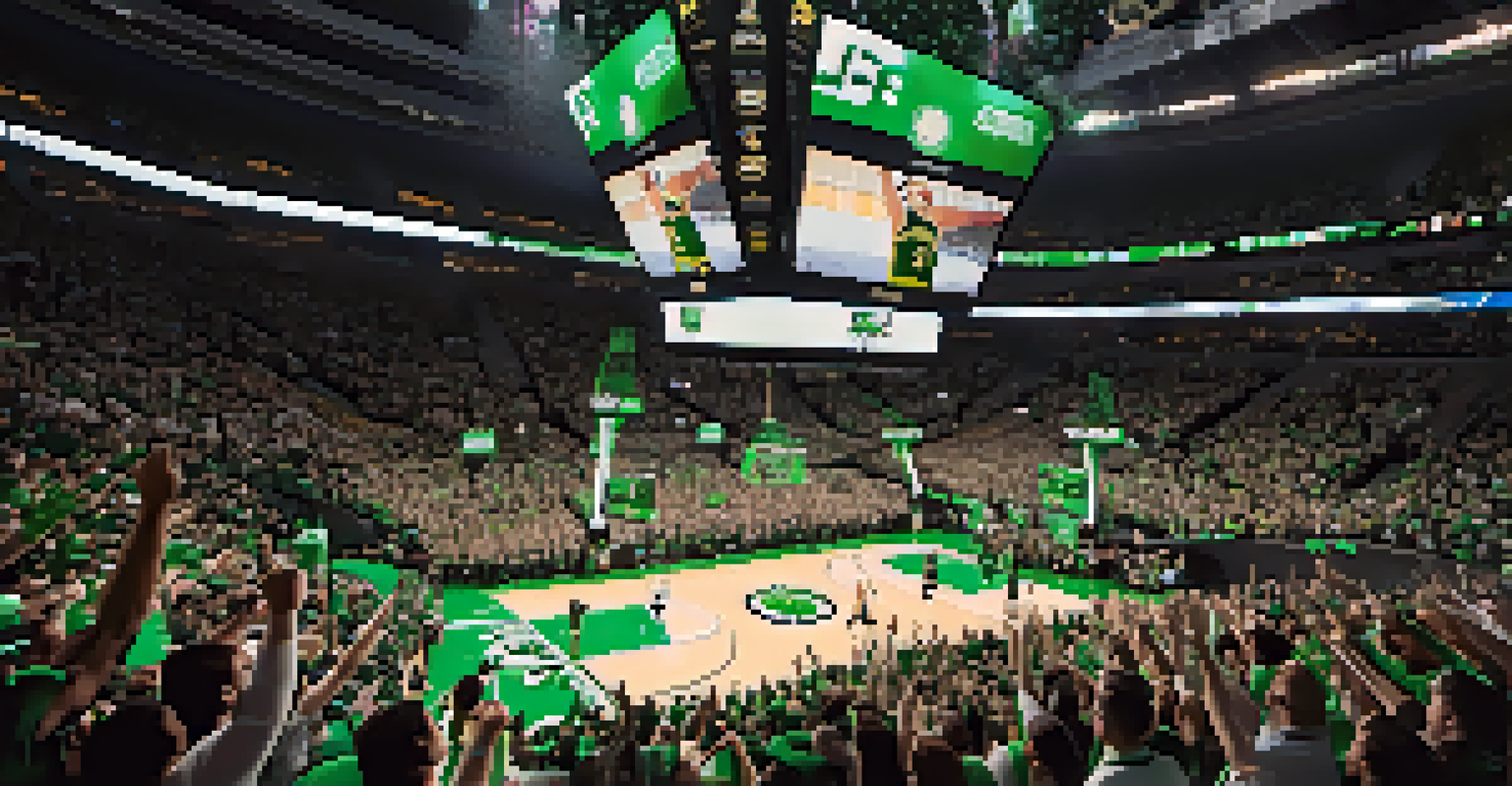Exploring Boston's Historic Sports Facilities and Their Impact

The Rich History of Boston's Sports Legacy
Boston is a city steeped in sports history, boasting a legacy that dates back over a century. From the iconic Fenway Park, home of the Red Sox, to the storied TD Garden, where the Celtics and Bruins battle for glory, each venue tells a unique story. These facilities are not just places to watch games; they are landmarks that embody the spirit and passion of Boston's sports culture.
Fenway Park is the most beloved ballpark in America, and its history is a reflection of the city of Boston itself.
The city's dedication to athletics is evident in how these venues have evolved over the years. For instance, Fenway Park, established in 1912, has undergone renovations while still retaining its vintage charm. This blend of tradition and modernization reflects Boston's ability to honor its past while embracing the future.
Moreover, the fervor of Boston's sports fans creates an atmosphere like no other. Whether you’re cheering for the Patriots at Gillette Stadium or enjoying a hockey game at the Garden, the energy in the air is palpable. This connection between the fans and the venues plays a crucial role in the city's identity, making sports an integral part of Boston’s cultural fabric.
Fenway Park: A Testament to Tradition
As one of the oldest ballparks in Major League Baseball, Fenway Park is a true icon. Its distinctive features, such as the Green Monster and the manual scoreboard, have made it a beloved symbol of baseball in America. Visiting Fenway isn't just about watching a game; it's about experiencing a piece of history that has witnessed countless memorable moments.

Beyond the games, Fenway Park serves as a venue for various events, from concerts to charity functions. This versatility allows the park to remain relevant in the community, drawing in both locals and tourists alike. The stories shared here, from heart-stopping World Series wins to legendary player debuts, contribute to the park’s rich narrative.
Boston's Sports Venues as Cultural Icons
Historic venues like Fenway Park and TD Garden serve not only as sports facilities but also as cherished cultural landmarks that embody Boston's rich sports legacy.
Fenway’s influence extends beyond just sports; it has become a cultural landmark for Boston. The park has inspired movies, literature, and even music, capturing the hearts of many. This enduring legacy highlights Fenway's role not only as a sports facility but also as a cherished cultural touchstone for Bostonians.
TD Garden: Home of Champions
TD Garden, often referred to as 'The Garden', is another pillar of Boston’s sports scene. Opened in 1995, it has quickly become synonymous with high-stakes basketball and intense hockey matchups. Home to the Boston Celtics and the Boston Bruins, this arena brings together fans from all walks of life to celebrate their teams.
Sports is a universal language that brings people together, and that is what Boston embodies with its rich sports culture.
The atmosphere during a Celtics game is electric, with fans donning their green and white jerseys, ready to cheer their team to victory. Similarly, Bruins fans create a fierce environment, particularly during playoff season. This passionate support not only elevates the players' performances but also fosters a strong sense of community among attendees.
Moreover, TD Garden plays host to concerts and events, showcasing its versatility. From major musical acts to wrestling matches, the venue adapts to various forms of entertainment, drawing people to the heart of Boston. This adaptability has solidified its status as a cultural hub, intertwining sports and entertainment in a way that resonates with the city's vibrant spirit.
Gillette Stadium: A Modern Sports Marvel
Located just outside Boston, Gillette Stadium has become the home of the New England Patriots and Revolution soccer team. Opened in 2002, this cutting-edge facility represents the modern era of sports venues, with state-of-the-art amenities and a design that prioritizes fan experience. Its capacity to host over 65,000 spectators makes it a significant player in the region's sports landscape.
Gillette Stadium is renowned for its tailgating culture, where fans gather hours before kickoff to celebrate and bond over their shared love for the game. This pre-game ritual enhances the overall experience, creating lifelong memories and friendships. The stadium has also hosted major events, including concerts and the Super Bowl, further cementing its place in sports history.
Community Engagement Through Sports
Boston's sports facilities play a vital role in community building by hosting charity events and youth programs, fostering a strong sense of belonging among residents.
The impact of Gillette Stadium extends beyond just sports; it has revitalized the surrounding area economically. The influx of fans stimulates local businesses and promotes tourism, showcasing how a modern sports facility can contribute to community growth. This synergy between the stadium and the local economy exemplifies the broader influence of sports on Boston's development.
Boston College and the Spirit of Collegiate Sports
Boston College (BC) adds another dimension to the city's sports landscape, particularly through its collegiate athletics. The school's dedication to sports is evident in the impressive facilities that house various teams, including football, basketball, and hockey. BC's alumni and students bring a unique energy to the games, fostering a strong sense of school pride.
The iconic Alumni Stadium, where the Eagles football team plays, showcases the enthusiasm of college sports. With its intimate setting, fans feel closely connected to the action on the field, creating an exhilarating game-day atmosphere. The traditions that accompany BC games, like the 'Fight Song' and tailgating, further enhance the experience for attendees.
Moreover, BC’s commitment to excellence in athletics and academics reflects the spirit of Boston itself. The university's success in sports, particularly in hockey, has earned it a prominent place in the NCAA landscape. This blend of educational and athletic achievement resonates with Boston’s broader values, making collegiate sports an essential part of the city's identity.
The Role of Sports in Community Engagement
Boston's historic sports facilities do more than host games; they play a pivotal role in community engagement. From charity events to youth sports programs, these venues provide a platform for local organizations to connect with residents. This interaction fosters a sense of belonging and strengthens the community's ties to its sports teams.
For instance, organizations like the Boston Red Sox Foundation utilize Fenway Park to promote various charitable initiatives. Programs aimed at youth development and health awareness often take center stage at these facilities, showcasing how sports can be a catalyst for positive change. This commitment to social responsibility enhances the reputation of Boston's teams and facilities.
Future of Sports Embraces Innovation
As Boston looks ahead, the integration of new technologies and experiences in sports is set to attract younger audiences while preserving traditional values.
Furthermore, the sense of unity that emerges from attending games transcends sports. Friends and families gather to support their teams, creating lasting memories that contribute to the city’s collective identity. By engaging with the community, Boston’s historic sports facilities reinforce the idea that sports are a powerful force for good, bringing people together in celebration.
Preserving the Legacy of Historic Sports Venues
As Boston continues to grow, preserving the legacy of its historic sports facilities becomes increasingly important. Organizations and city officials recognize the value these venues hold, not just as sites for athletic competition, but as cultural landmarks that tell the story of Boston's sports heritage. Efforts to maintain and restore these facilities ensure future generations can experience their rich history.
For example, initiatives aimed at preserving Fenway Park have included renovations that respect its original design while updating its amenities. These efforts reflect a commitment to honoring the past while providing a modern experience for fans. Such preservation activities resonate with Bostonians who take pride in their city’s history and wish to keep it alive.

In conclusion, the legacy of Boston's historic sports venues is more than just their age; it's about the memories and stories they hold. By focusing on preservation, the city can ensure that these spaces continue to serve as gathering points for fans, fostering community connection and pride for years to come. This dedication to preserving history is a testament to the enduring impact of sports in Boston.
The Future of Sports in Boston
Looking ahead, the future of sports in Boston is bright, fueled by a rich history and a passionate community. With ongoing developments in sports technology and fan engagement strategies, the city is poised to become a leader in the sporting world. New facilities and renovations to existing ones will continue to enhance the experience for fans and athletes alike.
The rise of eSports and the integration of virtual experiences into live sports events are just a glimpse of what’s to come. As Boston embraces these trends, it will attract a younger audience while maintaining its traditional fan base. This adaptability is essential for the city to remain relevant in an ever-changing sports landscape.
Ultimately, Boston's historic sports facilities will continue to play a vital role in shaping the city's future. By honoring their heritage and embracing innovation, these venues will ensure that Boston remains a vibrant hub for sports and community engagement for generations to come. The legacy of sports in Boston is alive and well, ready to evolve while staying true to its roots.